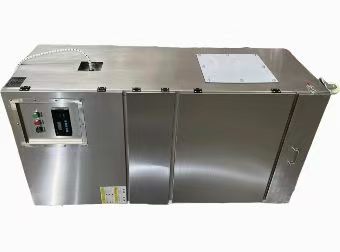Industrial Dust Collectors: A Key to Cleaner and Safer Work Environments
2024-12-20
In industrial settings, air quality is a critical concern. The accumulation of dust, fumes, and particulate matter not only hampers operational efficiency but also poses significant health and safety risks. Industrial dust collectors are the unsung heroes of modern industry, designed to tackle these challenges and maintain cleaner, safer, and more efficient work environments.
What is an Industrial Dust Collector?
An industrial dust collector is a system used to capture, filter, and remove airborne particles and pollutants generated during manufacturing processes. These devices ensure compliance with environmental standards, protect worker health, and enhance the longevity of machinery by preventing dust buildup.

How Does an Industrial Dust Collector Work?
The operation of an industrial dust collector typically involves these steps:
1. Air Capture:
Dust and airborne particles are drawn into the system through hoods or ducts.
2. Filtration:
The air passes through filters designed to trap particulate matter while allowing clean air to flow through.
3. Dust Collection:
Collected dust is stored in a hopper or bin for safe disposal or recycling.
4. Clean Air Discharge:
Filtered air is released back into the environment or the facility.
Types of Industrial Dust Collectors
1. Baghouse Dust Collectors:
- How It Works: Utilizes fabric filter bags to capture particles.
- Best For: High-volume applications, such as cement, metalworking, and woodworking industries.
2. Cartridge Dust Collectors:
- How It Works: Features compact, pleated filters for efficient dust capture.
- Best For: Industries requiring fine dust removal, like pharmaceuticals and food processing.
3. Cyclone Dust Collectors:
- How It Works: Uses centrifugal force to separate heavier particles from the airflow.
- Best For: Pre-filtering large particles or handling coarse dust.
4. Wet Scrubbers:
- How It Works: Removes pollutants by trapping them in a liquid medium.
- Best For: Applications involving sticky or combustible dust.
5. Electrostatic Precipitators (ESP):
- How It Works: Charges particles electrically and collects them on oppositely charged plates.
- Best For: Industries requiring precise particulate control, like power plants.
Benefits of Industrial Dust Collectors
1. Improved Air Quality:
Removes harmful particles, creating a healthier work environment.
2. Enhanced Equipment Life:
Prevents dust from damaging machinery, reducing maintenance costs and downtime.
3. Compliance with Regulations:
Helps meet air quality standards set by environmental agencies.
4. Increased Productivity:
Cleaner workspaces lead to more efficient operations and improved worker morale.
5. Energy Efficiency:
Modern systems recycle filtered air, reducing the need for additional heating or cooling.
Key Features to Look For
1. Filter Efficiency:
High-efficiency particulate air (HEPA) filters can capture particles as small as 0.3 microns.
2. Airflow Capacity:
Ensure the system can handle the volume of air your facility generates.
3. Ease of Maintenance:
Look for features like automatic filter cleaning systems.
4. Durability:
Choose materials that can withstand harsh industrial environments.
5. Customizability:
Some systems offer modular designs to suit specific operational needs.
Applications Across Industries
1. Manufacturing:
Captures metal shavings, dust, and fumes from welding and cutting.
2. Woodworking:
Removes sawdust and wood particles to ensure cleaner and safer workspaces.
3. Pharmaceuticals:
Maintains a sterile environment by filtering fine powders and airborne contaminants.
4. Food Processing:
Prevents contamination and maintains hygiene by capturing flour, sugar, and spice dust.
5. Mining and Quarrying:
Controls silica and coal dust to protect workers and equipment.
Challenges and Maintenance
- Filter Replacement: Regularly inspect and replace filters to ensure efficiency.
- System Sizing: Choosing the right size system is critical to avoid overloading or underperformance.
- Energy Consumption: Opt for energy-efficient models to balance performance and operational costs.
---
Future Trends in Dust Collection Technology
- Smart Systems: Integration with IoT for real-time monitoring and automated adjustments.
- Energy Efficiency: Innovations like regenerative filters to reduce energy usage.
- Eco-Friendly Solutions: Development of systems that use biodegradable or recyclable filters.
---
Conclusion
Industrial dust collectors are an indispensable part of modern industry, ensuring cleaner air, safer work environments, and more efficient operations. Whether you’re in manufacturing, mining, or food processing, investing in a high-quality dust collection system is a step toward sustainability and operational excellence. With advances in technology, these systems are becoming more efficient, cost-effective, and environmentally friendly, making them a worthwhile investment for any facility.


